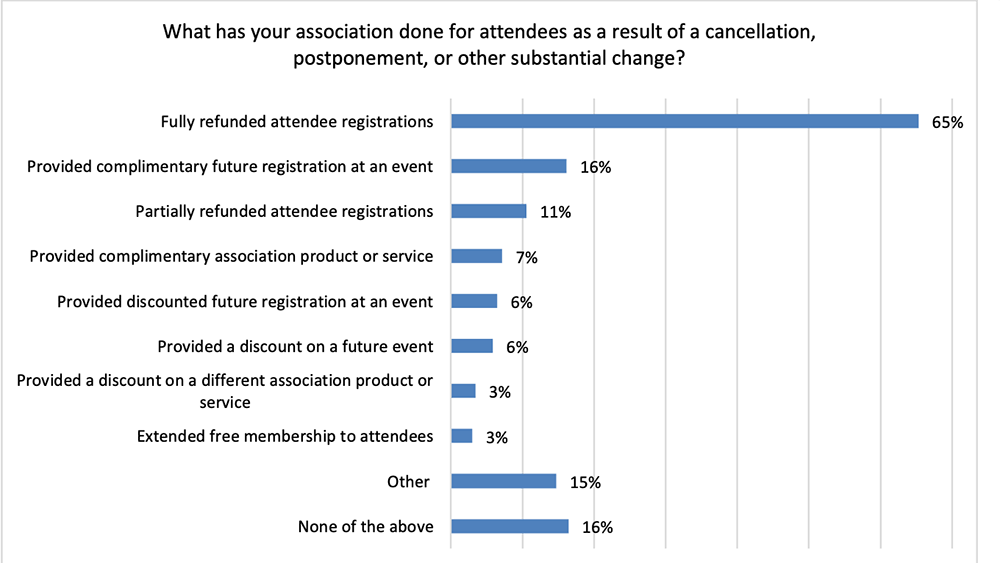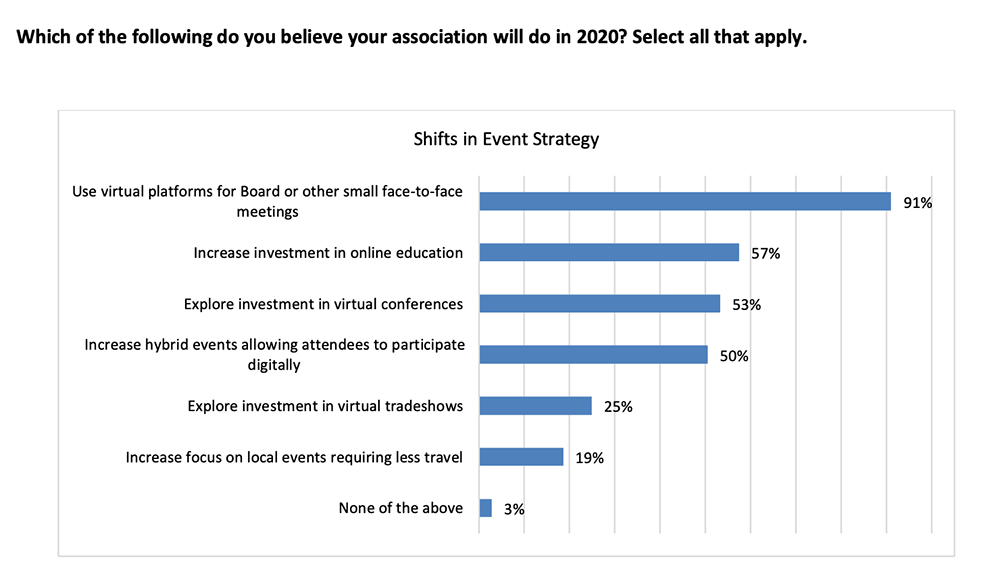
A recent survey conducted by Association Laboratory found that given the focus of the COVID-19 impact on face-to-face/in-person meetings, any association without reserves equal to or greater than anticipated meetings income could be designated as at-risk.
Takeaways:
- A recent survey found that more than half of association executives indicated their association had canceled or postponed a face-to-face meeting. Thirty-five percent said efforts are being made to expand virtual access to programming, and 9 percent said they moved an event to a different location.
- Sixty-five percent of respondents who canceled an event lacked the insurance coverage necessary to cover those incurred costs.
- Virtual events will be a major strategy component for associations moving forward.
Association Laboratory Inc. surveyed association executives in mid-March and found that 56 percent indicated their association had canceled or postponed a face-to-face meeting. Thirty-five percent said efforts are being made to expand virtual access to programming, and 9 percent said they moved an event to a different location.
Further review of the data indicates that the larger the association, the more likely they are to have canceled an event and they are also more likely to have expanded virtual access or moved the event online. Also playing a role: As the geographic scope of membership increased, the likelihood that the association migrated a live event to an online platform increased. Association Laboratory speculates that “associations with more distributed members are more likely to have the technical infrastructure and staff competencies needed to implement the virtual strategy.”
The Strategic and Economic Impact of COVID-19 survey, authored by Association Laboratory President Dean West, includes 1,020 association executive responses from March 17-24.
Association Laboratory concludes that given the focus of the impact on face-to-face/in-person meetings, any association without reserves equal to or greater than anticipated meetings income could be designated as at-risk. The average respondent had 39 percent of its annual budget in designated reserves, although this percentage varied widely among respondents.
Insufficient Insurance
One potential solution to reduce downside risk was carrying event cancellation insurance. Having insufficient coverage was defined as respondents indicating they had no insurance or that their insurance definitely or probably did not cover incurred costs. Sixty-five percent of respondents who canceled an event lacked the insurance coverage necessary to cover those incurred costs. Thirty percent do not have event insurance.
Associations without access to proceeds from event cancellation insurance are more at risk for strategic economic disruption that might place the long-term viability of the association in question.
 Taking Care of Stakeholders
Taking Care of Stakeholders
When it came to how associations addressed refunds for attendees, sponsors, and exhibitors at canceled events, the survey found that 65 percent of respondents had fully refunded the registration fees, and one out of five provided a complimentary future registration at an event.
Sponsor and exhibitor contributions were returned at a substantially lesser degree. Only one-quarter of respondents indicated they had fully refunded sponsorship funds and only 28 percent of respondents fully refunded exhibitor fees.
A Hit on Annual Revenue
Needless to say, the financial impact of these cancellations will affect associations’ bottom lines: 72 percent of respondents indicated their total annual revenue would decrease in 2020 and more than 27 percent indicated revenue also would be down in 2021.
Travel Restrictions
While travel restrictions originally were put into place to avoid the spread of the coronavirus, Association Laboratory concludes that economic challenges, with corresponding cost cutting, will continue to be a drag on face-to-face events — reducing participation and requiring association leaders to re-evaluate everything from sponsor strategy to future room blocks. It will be necessary to develop online tools to retain relations with key individuals and companies.
 Moving Forward
Moving Forward
West said that while face-to-face activities for many associations will continue to be an important part of their portfolio, “the business environment has reached a tipping point where meetings, as a focus of association activity, will decrease.” The counterpoint to that is that virtual events will rise — in fact, associations were shifting their focus to the digital and online environment prior to the COVID-19 crisis. In Association Laboratory’s global environmental scan of the association strategy environment, conducted in December 2019, 61 percent of respondents said that they were expanding online or virtual education.
West cautioned against assuming that things will return once again to the way they were. “I believe it is more prudent and honest to look at the future with clear eyes, understanding that the world in which we operate,” he wrote, “will be different. We must understand that the assumptions that historically guided us may no longer be true or valid.”
But he underscored the opportunity to make 2020 the year to become “the best version of ourselves,” West wrote in the report. “Our most innovative, adaptive and resilient selves. A community that refuses to back down from the challenges that we face.”
You can download the full report at the Association Laboratory website.
Paul Bergeron is a freelance writer based in Herndon, Virginia.
What Events Professionals Need to Know About COVID-19
PCMA has created a COVID-19 resources page to help event professionals find reliable information about the pandemic and to share events industry-related resources to ensure they are prepared now and in the future.
